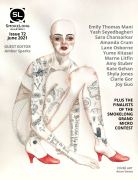“Sheet” feels beautifully raw to me, as if Audrey’s experience is spilling right onto the page. Terese Marie Mailhot talks about how creating a sense of rawness often, paradoxically, requires rigorous craft. Did you consciously craft this story to have a raw feel, did it happen spontaneously, or was it a bit of both?
I’ve been writing for a really long time, and I went through graduate school where people talked a lot about craft and theory. Even so, I still feel sort of uncertain when trying to talk about craft. The honest answer is that usually I write a story because I hear a line or two of it in my head almost like a song, and it repeats until I do something with it. That was the case for the first few lines of this story. I didn’t fully know what it was or meant, but I liked the rhythm of it and wanted to see where it would go. When I write anything, I usually want to make poetic sentences (in terms of word choices but also the sound of them, the rhythm) and make people feel something. I’m also increasingly interested in experimentation with regard to form and how a story unfolds. Does that count as craft? I did think about those things when writing this, but, also, whatever rawness it might have probably just came out like this, without a lot of intention or tinkering.
What surprises did you encounter while writing “Sheet?”
What surfaces in a story is often surprising. When you’re writing something, it’s almost like a weird tree that bears the random, really different fruits of a few things you’ve been thinking about or listening to or watching, and you often don’t know how these things are going to come out on the page or when.
I wrote this right after finishing a big revision of a first novel. It had been brought to my attention that I had one too many “people going into water” scenes in the book, and I was embarrassed by that. Then I wrote this story and mid-way through realized, “Oh, no, I’m writing another ‘person going into water,’ scene.” That surprised me, in a cringey way, so I consciously tried to do something different with it by making the character question it and call it out.
Also, the tomato soup and the opossum surprised me. I had no idea I was going to write about this tomato soup-loving person who at one point has an opossum hanging off her arm. I guess that is part of the fun of writing. I’m not a big outline person (maybe I should be!), and I don’t always know what’s coming next as I’m writing. So having something weird or unexpected emerge makes me happy.
The sheet is an intriguing metaphor for what’s been obscuring Audrey’s mental illness and turmoil. A sheet preserves and protects. But it also has an antiseptic quality and even death associations (shrouds, ghost costumes). How do you view the metaphorical sheet and its removal?
I view the sheet as representing convention and expectation. Removing it is, for Audrey, a kind of freedom. I know this may risk coming across as romanticizing mental illness, and that’s not my intent. But I also wanted this to be very much in her head, and for her, removal of connection to societal expectations has a beauty to it.
I’m working on a second novel, and this character, in a slightly different form, is in that book, which focuses on, among other things, ideas of the self, philosophy, hallucinogens, and monogamy. The characters are in the process of essentially unraveling from whatever lives they had or thought they wanted. In Audrey’s case, it’s obviously not a choice; in the book, she’s dealing with postpartum psychosis. But I guess I wanted this story to show some of the strange, scary beauty of cutting loose from everything.
If sheet-free Audrey could say one thing to Before Audrey, what would it be?
There’s a part of me that’s always wanting to run off into the woods. I guess I have a pretty extreme escapist bent or something. But my first thought on reading this question was that she would have said, “Go, do it.” That’s not exactly apt, though, because it suggests more agency and control than this character maybe has at this moment. So I think she’d say what probably everyone needs and wants to hear all the time, even if/when it’s a lie, “You’re okay” or “You’ll be okay.”
Audrey requests tomato soup from someone offering help. What gives you comfort in your times of need?
Listening to music while walking into uncrowded places, joking around with my kids, cleaning the shit out of things as distraction, sarcasm, talking to my family on the phone, bad TV, friends (and especially writer friends who’ve helped me at all my low moments this year). Not soup.



 The SmokeLong Grand Micro Contest (The Mikey) is now an annual competition celebrating and compensating the best micro fiction and nonfiction online.
The SmokeLong Grand Micro Contest (The Mikey) is now an annual competition celebrating and compensating the best micro fiction and nonfiction online.